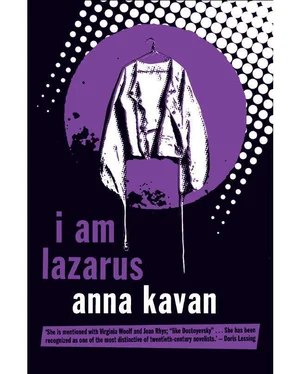Anna Kavan - I Am Lazarus
Здесь есть возможность читать онлайн «Anna Kavan - I Am Lazarus» весь текст электронной книги совершенно бесплатно (целиком полную версию без сокращений). В некоторых случаях можно слушать аудио, скачать через торрент в формате fb2 и присутствует краткое содержание. Год выпуска: 2013, Издательство: Peter Owen Publishers, Жанр: Современная проза, на английском языке. Описание произведения, (предисловие) а так же отзывы посетителей доступны на портале библиотеки ЛибКат.
- Название:I Am Lazarus
- Автор:
- Издательство:Peter Owen Publishers
- Жанр:
- Год:2013
- ISBN:нет данных
- Рейтинг книги:3 / 5. Голосов: 1
-
Избранное:Добавить в избранное
- Отзывы:
-
Ваша оценка:
- 60
- 1
- 2
- 3
- 4
- 5
I Am Lazarus: краткое содержание, описание и аннотация
Предлагаем к чтению аннотацию, описание, краткое содержание или предисловие (зависит от того, что написал сам автор книги «I Am Lazarus»). Если вы не нашли необходимую информацию о книге — напишите в комментариях, мы постараемся отыскать её.
Julia and the Bazooka
Asylum Piece
I Am Lazarus — читать онлайн бесплатно полную книгу (весь текст) целиком
Ниже представлен текст книги, разбитый по страницам. Система сохранения места последней прочитанной страницы, позволяет с удобством читать онлайн бесплатно книгу «I Am Lazarus», без необходимости каждый раз заново искать на чём Вы остановились. Поставьте закладку, и сможете в любой момент перейти на страницу, на которой закончили чтение.
Интервал:
Закладка:
So you found your way here, he called out cheerfully. And how do you like my country residence? He waited for me to approach, laughing as if the whole thing were an excellent joke, and leaning out of the narrow window in which he had the appearance of being tightly wedged. Come up: you'll find it very snug, he went on. But as I put my foot on the lowest of the four steps that led to the door at the back of the caravan, he seemed to alter his mind, saying, Perhaps it's really a bit cramped for the two of us inside, and on such a fine afternoon we'd do better out of doors.
Next moment he opened the door and brought out two folding chairs which he passed to me down the steps. If you'll just take these I'll see if I can find some refreshments, he said. Through the little door I could only get a glimpse of the interior of the caravan littered with books and papers amongst which Benjo's enormous figure was rummaging. Then he came out with some glasses and bottles of beer and the door was banged shut.
I seem to have given you a surprise, he said while the chairs were set up on the slippery brown floor of pine needles. He kept laughing as he poured out the beer, and I could see he was very much tickled by my astonishment.
But is this where you really live? I asked in the stupid way that one falls into when one's thoroughly taken aback. I don't know what sort of a house I'd expected Benjo to have; probably some showy villa in keeping with his style of dress. I noticed that he was just as spick-and-span in his gaudy way as at our previous meeting, and I wondered how he managed to look so dandified when he lived like a gipsy. There didn't seem any room for his clothes or anywhere to keep them in the caravan. And what was the meaning of all those books and papers? Benjo was the last person I should have suspected of studious habits. Could he be conducting some kind of private business out here in the woods? I began to realize then what a dark horse the fellow was.
I come and go, he said, just as he'd said it before. Here to-day and gone to-morrow, you know. Then, as if he guessed my doubts and wanted to banish them, he became serious and went on in a very reasonable tone, Of course, it has its drawbacks, it's not luxurious, it's by no means all that I could wish. But on the other hand there are definite advantages in this style of living. It's cheap and healthy, and convenient for getting about, and I'm able to get through a lot more work than I would if I were living somewhere where people were continually dropping in on me and distracting my attention.
I didn't know what to think. There was certainly something queer and inexplicable about Benjo; and at the same time he was so naif and so anxious to be friendly that it seemed unworthy and even absurd to distrust him. After all, he was more like a big, clumsy, harmless, friendly animal than a man, lolling back there in his seat with a drowsy, good-natured grin. Most likely there was some quite simple explanation of his odd idiosyncrasies.
I stopped with him until we had finished the beer, but without getting a second chance of looking inside the caravan. Feeling that I'd already been guilty of rudeness in displaying so openly my surprise at his living arrangements, I didn't like to ask any questions. Benjo himself did not refer again to his mysterious ‘work’: nor did he again mention his domicile until, just as I was leaving, he remarked, Now you can see why I envy you your cosy quarters up there on the hill.
I've described this interview with Benjo in some detail because, in its way, it was typical of my whole association with him. I suppose ‘association’ is the right word to use about a relationship which always continued superficially cordial without ever remotely approaching intimacy and without ever losing (on my side) a faint element of uneasiness. In spite of my longing for solitude there were days when loneliness overcame me in the strange country and I was glad to see Benjo's massive form loafing along in some garish costume. At other times I would be irritated by him almost unbearably, or filled with a vague, amorphous suspicion that even bordered upon alarm. Living alone in a lonely place one's few human contacts assume disproportionate importance, and so Benjo occupied a larger place in my mind than was warranted by the actual time that we spent together. How often did we see one another? I have the impression that at some periods we met frequently, almost daily. At other times weeks would go by between our encounters. Quite often Benjo would leave the village, and for days on end his caravan would be missing from the clearing among the pines. When this happened, I believe that I experienced a lightening, a sense of relief, of which, however, I myself was hardly aware. Yet I was not displeased when, after a solitary spell, I heard that he had returned. It was almost invariably the old cleaning woman who first gave me the news. Benjo came back last night, she would announce while she was fetching a broom from the corner or starting to wash up the breakfast dishes. Or, Benjo will be with us again before sundown. I didn't ask her, though I often wanted to, how she obtained this information about his movements which she never failed to pass on in a portentous voice as if it had some special personal significance for me.
Looking back now, it seems to have been Benjo who visited me far more often than I visited him. In fact, I can't really be certain that I went again more than once or twice to the caravan or that I ever got another glimpse of its interior. Probably one of the reasons for this was that in order to get to the fir plantation one had to walk through the village, and I always avoided the place as much as I could. There was something indefinably depressing to me about the grey little houses and their uncompromising inhabitants. Benjo, on the contrary, was quite at home in the village where he spent a good deal of time drinking and gossiping at the inn, apparently on excellent terms with the habitues. From there it was an easy walk for him to my house, and he acquired the habit of strolling up the hill with a bottle of beer which we would divide between us. His behaviour towards me was always precisely the same. The same lazy, jolly, bantering manner; the same flippant, slightly malicious talk about this trifle or that; the same indolent way of slouching round, hands in pockets and head tilted to one side, staring at everything in sight. As time went on this trick of his got on my nerves more and more acutely. My irritation reached such a pitch that I could hardly restrain myself from bursting out in protest at his inquisitive attitude. Yet all the time I was bothered by the feeling that my annoyance was unjustifiable. Why should I resent a person taking a friendly interest in my activities? Everything I did seemed to interest Benjo, whether I was gardening or working indoors, painting a cupboard or putting up shelves or some such odd job in the way of making the place more comfortable. He would lounge near me for hours, not helping actively, but encouraging me with appreciation and sometimes with suggestions of his own, and all the while smiling with the sort of complacent expression that might be worn by a landlord who watches a good tenant improving his property.
When winter came on I expected to see less of him. The winters aren't very severe in that district, but the high winds and heavy rainstorms are quite enough to make a camper's life unattractive. Benjo, however, continued to come and go as usual, although he grumbled about his hardships whenever we met. I simply couldn't understand the man's conduct. His clothes were as expensive and ostentatious as ever, he seemed to have money to bum, for I heard stories of how he would turn up at the inn with his pockets stuffed full of notes and coins and stand treat to the whole village. Why on earth didn't he take himself off to some reasonable dwelling?
Читать дальшеИнтервал:
Закладка:
Похожие книги на «I Am Lazarus»
Представляем Вашему вниманию похожие книги на «I Am Lazarus» списком для выбора. Мы отобрали схожую по названию и смыслу литературу в надежде предоставить читателям больше вариантов отыскать новые, интересные, ещё непрочитанные произведения.
Обсуждение, отзывы о книге «I Am Lazarus» и просто собственные мнения читателей. Оставьте ваши комментарии, напишите, что Вы думаете о произведении, его смысле или главных героях. Укажите что конкретно понравилось, а что нет, и почему Вы так считаете.












